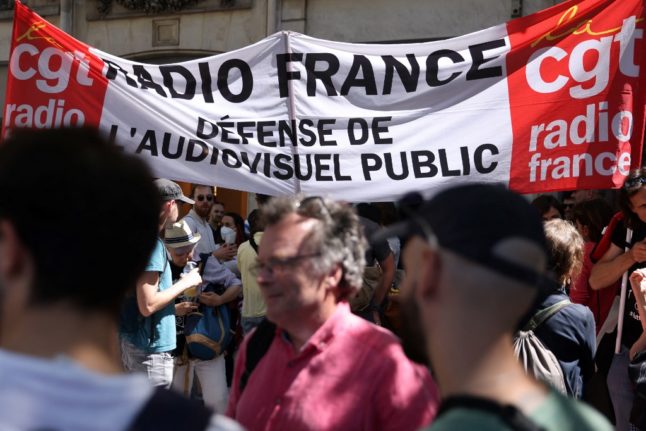Households in France will no longer have to pay for an annual TV licence after parliament approved scrapping the annual €138 per household charge, meaning that this November the usual tax bill will simply not arrive.
The measure is part of a €65 billion package of financial aid to help people cope with the spiralling cost of living.
Revealed: What will you get from the cost-of-living package?
But abolishing the TV licence was not without its critics, while questions remain over the future funding of France’s public service broadcasters.
The €138 annual fee has been used to finance the TV and radio channels in the public sector.
It raises €3.7 billion a year – 65 percent of which is allocated to France Télévisions, 15.9 percent to Radio France, 7.5 percent to Arte, 7 percent to France Médias Monde, 2.4 percent to audiovisual archive agency INA and 2.1 percent to TV5 Monde, a Senate report revealed.
TV licence funding currently supplies about half of the total turnover of France Télévisions, while the rest comes from advertising.
Proposing the licence fee cut, president Emmanuel Macron said he wanted to define a budget “with multi-year visibility”, with fixed financing amounts. But, no long-term concrete plans are currently in place.
The government has said there is no question of public service broadcasters losing money, insisting it will replace the licence fee “euro for euro” with public subsidies financed by VAT.
This model, however, is guaranteed only to the end of 2024 – after which the government will have to present different financing strategies to Parliament.
Despite the bill passing, Senators lined-up to criticise the absence of a concrete long-term funding strategy.
Les Républicains’ Jean-Raymond Hugonet said the plans were being pushed through too quickly for populist reasons and argued it was a change that should have come with a definitive public broadcasting strategy.
Socialist senator David Assouline said Malak had “hailed the glory” of French public broadcasting but was “creating the conditions to weaken it”.
Assouline has long been a critic of the plan. “From the moment there is no more dedicated funding and we have to draw from the general state budget, we will end up being told that it all costs too much and that we have to cut expenses, close a channel, or even, as we already hear sometimes, privatise,” he told a demonstration against the plans in July.
Concerned staff at France Télévisions and Radio France went on strike at the end of June in protest at the changes, saying that getting rid of the fee amounted to a “threat” to the independence of the channels in question.
Unions and cultural experts have expressed concern about the possibility that broadcasters’ independence would be eroded if financing was at the whim of the government of the time. Bruno Patino, the head of Arte France, has told AFP that he feared for his channel’s future if the funding model changed.
Another critic, cultural economist Françoise Benhamou told Le Monde: “The disadvantage of budgeting is that we are much less protected from the vagaries of politics, since the latter decides on the budget.”
And LFI MP and journalist Clémentine Autain said in July: “This is a highly political and dangerous measure. Democracy needs a strong public audiovisual service, with a fair financing system that guarantees independence.”



 Please whitelist us to continue reading.
Please whitelist us to continue reading.
Member comments